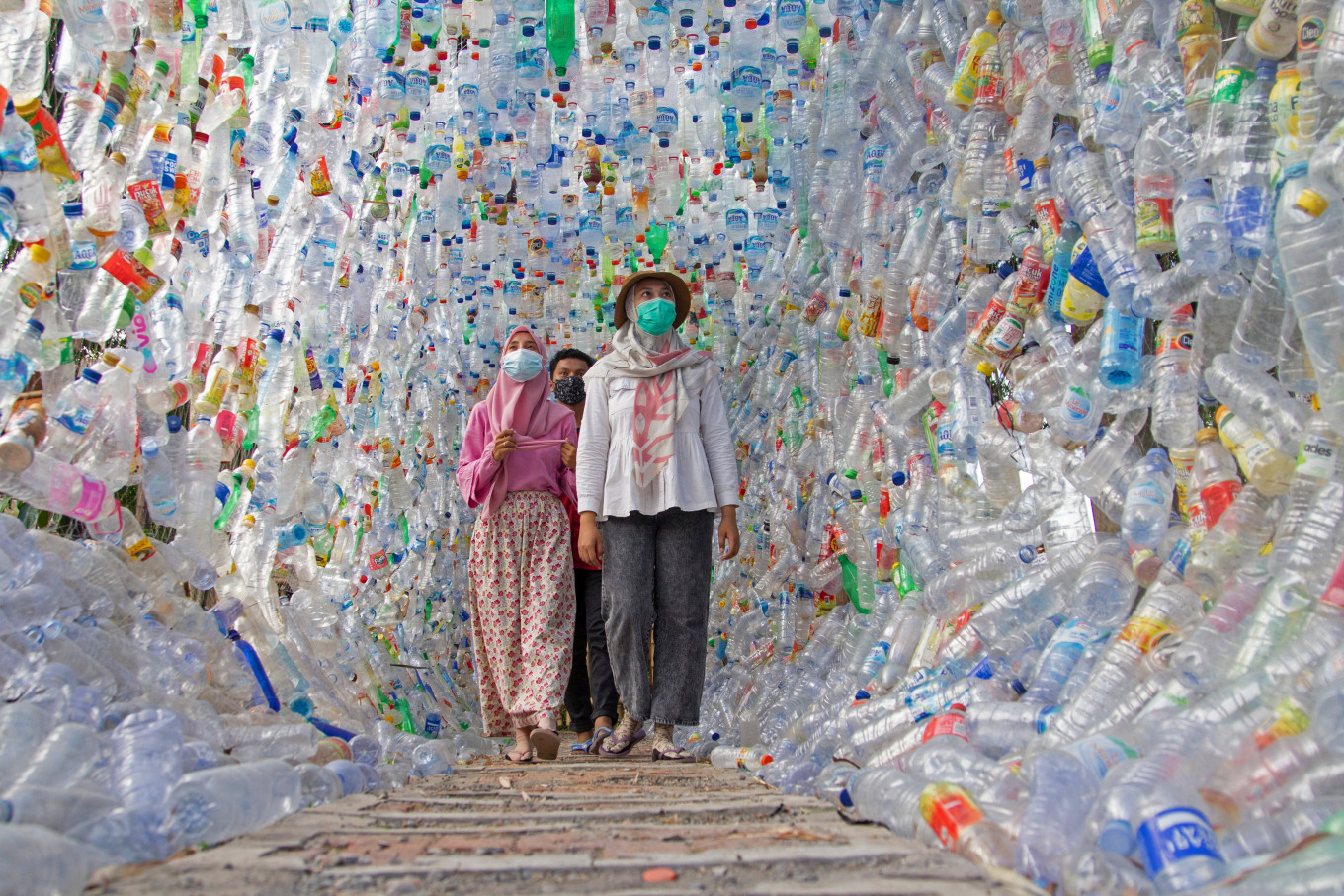Popular Reads
Top Results
Can't find what you're looking for?
View all search resultsPopular Reads
Top Results
Can't find what you're looking for?
View all search resultsWho’s leading the way in fixing the plastics crisis?
What is needed is a holistic approach to material design and production through to disposal and reuse.
Change text size
Gift Premium Articles
to Anyone
F
rom food packaging to smartphones, home insulation to electric vehicles, plastic is an essential material for everyday life. However, plastic pollution especially in our freshwater system and the oceans has sparked a public backlash as rapid production of disposable plastic products overwhelms the world’s ability to deal with them.
Images of fish, dolphins or seahorses entangled in plastic waste make for arresting visuals but it’s the ingestion of plastic by fish, mammals and humans that poses the more severe threat. Microplastics, tiny particles of less than five millimeters that break off from clothing, car tires, or personal care items, to name a few, are ending up in our food, water and air, causing harm to metabolic health and immunity and even increasing cancer risk.
While recognizing that we are dealing with a plastics crisis is a critical first step, tackling this issue is in fact a lot harder. The very qualities that make plastic ubiquitous – low cost, lightness, malleability – have deeply entrenched a throw-away culture with single use plastics accounting for at least 40 percent of plastics produced every year. Due to its low cost, people are not invested in reusing and recycling the plastic products and because of their properties, they do not biodegrade as well.
Popularly touted solutions often fall short. Recycling cannot significantly tackle the problem, partly because current technology can only process a narrow range of simple plastic products, partly because the industry has poor governance, with many cases of plastic recycling simply sent to incinerators or landfills.
On the other extreme, calls for “zero plastic” are unrealistic. Few materials compete with plastics in terms of breadth of application and some suggested alternative materials, like cardboard or glass, are far from environmentally friendly. Data suggests the entire lifecycle emissions of alternatives like glass and paper are higher.
What is needed is a holistic approach to material design and production through to disposal and reuse, with industry and government working together. This will require strong regulations to phase out harmful practices, as well as moves that encourage innovation and R&D into next-generation materials. To get there, we need to know how countries currently perform, and where the key obstacles lie.
Economist Impact, part of The Economist Group, has worked with the Nippon Foundation to produce the landmark 2021 Plastic Management Index (PMI), ranking 25 countries across a series of indicators from policy and regulation to business and consumer practices and attitudes. The initiative, part of the Back to Blue collaboration between our two organizations, present a worrying picture – while also pointing to useful strategies and actions taken by the leading nations.
The PMI’s most concerning finding is that lower-middle income countries are struggling the most to manage plastics, and Asian nations are clustered in the middle of the index in terms of performance. This is a concern because of how much of the global plastics industry is centered in these nations – and this is set to grow in the future as they develop their economies. Over half of the plastic waste leaked in the world’s oceans originates from five countries, all in Asia (China, Indonesia, the Philippines, Thailand and Vietnam). Our index found that the Middle East and Africa are struggling the most. Nigeria, Africa’s most populous nation, ranks bottom in three out of the four categories we measured.
But there is also cause for cautious optimism, as the index provides two useful insights. The first is revealing the countries that are leading the world and the reasons for their strong performance. Number-one ranked Germany, for instance, has achieved pole position thanks to a range of factors that include a consultative approach that works with businesses in the design of policies and programs, such as its successful recycling scheme, and strong national commitment evidenced through its efforts to put marine litter on the Group of 20 (G20) and G7 agendas.
But the PMI also shows that country performance is not strictly correlated to income level, gross domestic product or industrial competitiveness. Vietnam, a lower middle-income country, outperforms every upper-middle income country except China in our ranking. Malaysia ranks top globally for responsible consumer actions and perceptions. Kenya beats Germany in an index category which assesses private sector commitment to responsible plastics use.
The United States, the richest country and largest economy in the index, only ranks fifth overall. Intention and the will to act – by governments, industry and consumers – matters more than how wealthy or developed an economy is.
The PMI’s goal is not to name and shame - instead, it provides the first rigorous benchmark of how well countries around the world are managing plastics, an essential commodity for modern life. This can help governments across the globe reliably assess their strengths and weaknesses, identify exemplar nations who they can learn from and, as the index renews in future years, track performance with the long-term objective of driving meaningful policy action and outcomes.
***
The writer is manager for policy and insights at Economist Impact, a think-tank within The Economist Group. These views are personal.










